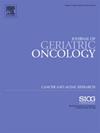Short-term mortality in older (≥70 years) patients with early breast cancer treated with neo‐/adjuvant chemotherapy: A Swedish nationwide retrospective population-based study
IF 3
3区 医学
Q3 GERIATRICS & GERONTOLOGY
引用次数: 0
Abstract
Introduction
There are substantial differences in the utilization of chemotherapy between younger and older patients, mainly due to the higher risk for adverse events among older patients. Short-term mortality after chemotherapy could reveal fatal side effects of treatment. The aim of this study was to explore the impact of treatment setting (neoadjuvant vs. adjuvant) and different chemotherapeutic agents on short-term mortality among older patients with early breast cancer.
Material and Methods
The population-based, national, research database BCBaSe 3.0 was used as a data source to identify older (≥70 years old) patients with stage I–III breast cancer, diagnosed between 2008 and 2019, who received neoadjuvant or adjuvant chemotherapy. Primary outcome was short-term mortality defined as death due to any cause within one year after breast cancer diagnosis. Multivariable logistic regression analysis was applied to investigate the impact of treatment setting and different chemotherapeutic agents (anthracycline-based vs. taxane-based vs. sequential anthracyclines and taxanes) on outcome, adjusted for potential confounders.
Results
In total, 4,072 older patients were treated with neoadjuvant or adjuvant chemotherapy and median age was 73 years (quartile [Q]1–Q3; 71–75). The one-year mortality rate was 1.5 % (95 % confidence interval [CI]: 1.2–1.9 % [63 of 4072 patients]). Risk factors independently associated with one-year mortality were older age, larger tumor size, positive nodal status, presence of triple negative breast cancer, and use of neoadjuvant as compared to adjuvant chemotherapy (odds ratio [OR]: 2.00, 95 % CI: 1.04–3.84). No association was found between type of chemotherapeutic regimen and one-year mortality. Median time to death was 7 months (interquartile range: 5–9). The reason for death was mainly classified as breast cancer-related (neoadjuvant: 78 %, n = 14; adjuvant: 49 %, n = 22), followed by potential treatment-related deaths (neoadjuvant: 11 %, n = 2; adjuvant: 27 %, n = 12).
Discussion
The short-term mortality rate at first year after diagnosis among older (≥70 years) patients with breast cancer was relatively low. The higher risk among patients treated with neoadjuvant chemotherapy could be attributed to residual confounding and deserves further evaluation. The low risk of potential treatment-associated death suggests that chemotherapy in this respect is safe, and older patients should not be disqualified for this treatment.
老年(≥70岁)早期乳腺癌患者接受新/辅助化疗的短期死亡率:一项瑞典全国回顾性人群研究
在化疗的使用上,年轻患者和老年患者有很大的差异,主要是由于老年患者发生不良事件的风险更高。化疗后的短期死亡率可以揭示治疗的致命副作用。本研究的目的是探讨治疗环境(新辅助与辅助)和不同化疗药物对老年早期乳腺癌患者短期死亡率的影响。材料和方法采用以人群为基础的国家研究数据库BCBaSe 3.0作为数据源,识别2008年至2019年间诊断的年龄≥70岁的I-III期乳腺癌患者,这些患者接受了新辅助或辅助化疗。主要结局是短期死亡率,定义为乳腺癌诊断后一年内因任何原因导致的死亡。采用多变量logistic回归分析来研究治疗环境和不同化疗药物(蒽环类药物、紫杉烷类药物、序贯蒽环类药物和紫杉烷类药物)对结果的影响,并对潜在混杂因素进行调整。结果共4072例老年患者接受了新辅助或辅助化疗,中位年龄为73岁(四分位数[Q] 1-Q3;71 - 75)。1年死亡率为1.5%(95%可信区间[CI]: 1.2 - 1.9%[63 / 4072例])。与一年死亡率独立相关的危险因素是年龄较大、肿瘤大小较大、淋巴结呈阳性、存在三阴性乳腺癌以及与辅助化疗相比使用新辅助化疗(优势比[OR]: 2.00, 95% CI: 1.04-3.84)。未发现化疗方案类型与1年死亡率之间存在关联。中位死亡时间为7个月(四分位数范围:5-9)。死亡原因主要分类为乳腺癌相关(新辅助:78%,n = 14;辅助治疗:49%,n = 22),其次是潜在的治疗相关死亡(新辅助治疗:11%,n = 2;辅助:27%,n = 12)。老年(≥70岁)乳腺癌患者诊断后第一年的短期死亡率相对较低。新辅助化疗患者的高风险可能归因于残留混杂因素,值得进一步评估。潜在治疗相关死亡的低风险表明,这方面的化疗是安全的,老年患者不应被取消这种治疗的资格。
本文章由计算机程序翻译,如有差异,请以英文原文为准。
求助全文
约1分钟内获得全文
求助全文
来源期刊

Journal of geriatric oncology
ONCOLOGY-GERIATRICS & GERONTOLOGY
CiteScore
5.30
自引率
10.00%
发文量
379
审稿时长
80 days
期刊介绍:
The Journal of Geriatric Oncology is an international, multidisciplinary journal which is focused on advancing research in the treatment and survivorship issues of older adults with cancer, as well as literature relevant to education and policy development in geriatric oncology.
The journal welcomes the submission of manuscripts in the following categories:
• Original research articles
• Review articles
• Clinical trials
• Education and training articles
• Short communications
• Perspectives
• Meeting reports
• Letters to the Editor.
 求助内容:
求助内容: 应助结果提醒方式:
应助结果提醒方式:


